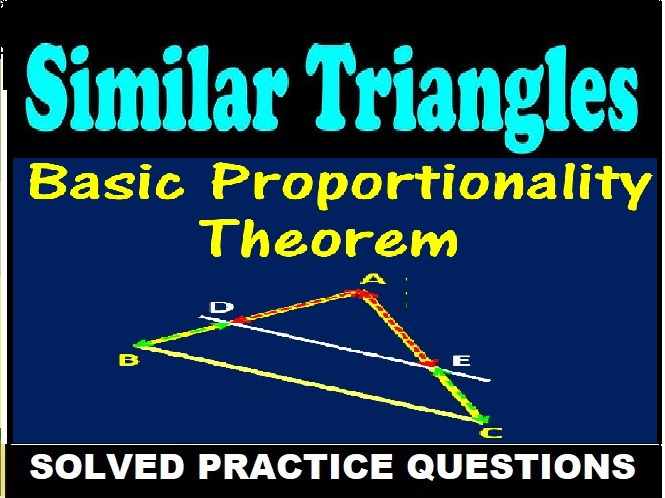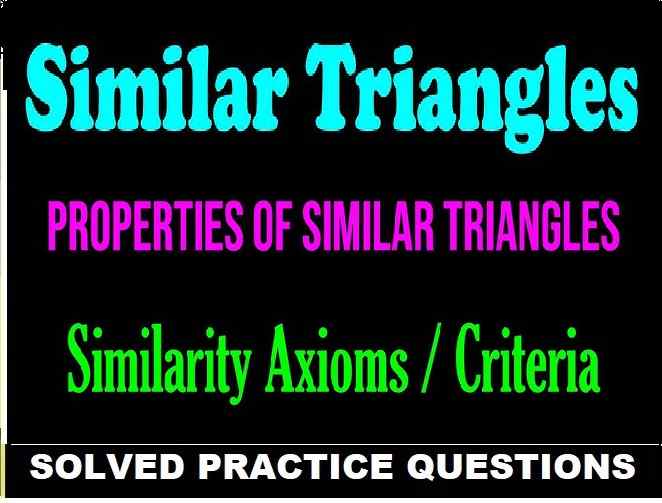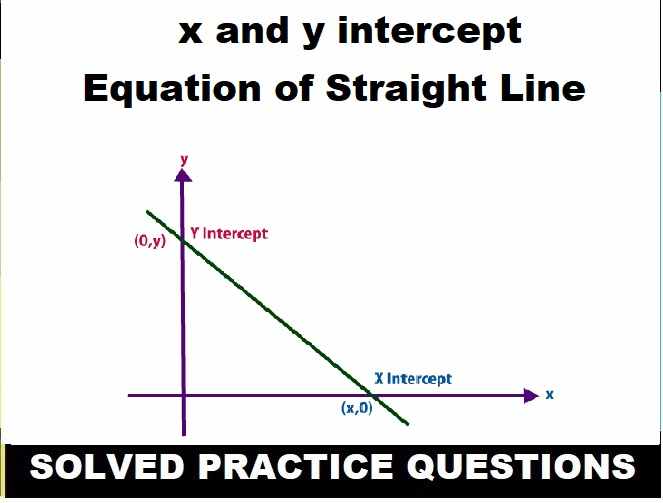ML Aggarwal Mensuration Exe-17.2 Class 10 ICSE Maths Solutions. We Provide Step by Step Answer of Exe-17.2 Questions for Mensuration as council prescribe guideline for upcoming board exam. Visit official Website CISCE for detail information about ICSE Board Class-10.
ML Aggarwal Mensuration Exe-17.2 Class 10 ICSE Maths Solutions
| Board | ICSE |
| Subject | Maths |
| Class | 10th |
| Chapter-17 | Mensuration |
| Writer / Book | Understanding |
| Topics | Solutions of Exe-17.2 |
| Academic Session | 2024-2025 |
Mensuration Exe-17.2
ML Aggarwal Class 10 ICSE Maths Solutions
Take π = 22/7 unless stated otherwise.
Question 1. Find the curved surface area of a right circular cone whose slant height is 10 cm and base radius is 7 cm.
Answer :
10 Slant height of a cone (l) = 10 cm
and radius of the base = 7 cm
Curved surface area = πrl
= 22/7 × 7 × 10 = 220 cm2
Question 2. Diameter of the base of a cone is 10.5 cm and slant height is 10 cm. Find its curved surface area.
Answer :
The diameter of the base of a cone = 10.5cm
Its radius (r) = 10.5/7 = 5.25 cm
and slant height (l) = 10 cm
Curved surface area = πrl
= 22/7 × 5.25 × 10 cm2
= 165.0 cm2
Mensuration Exe-17.2
ML Aggarwal Class 10 ICSE Maths Solutions
Page 406
Question 3. Curved surface area of a cone is 308 cm2 and its slant height is 14 cm. Find :
(i) radius of the base
(ii) total surface area of the cone.
Answer :
(i) Curved surface area of a cone = 308 cm2
Slant height = 14 cm
⇒ πrl = 308
⇒ (22/7) × r × 14 = 308
⇒ r = (308×7)/(22×14)
= 7
Hence the radius of the cone is 7 cm.
(ii) Total surface area of the cone = Base area + curved surface area
= πr2+ πrl
= (22/7) × 72 + 308
= (22/7) × 49 + 308
= 154 + 308
= 462
Hence the total surface area of the cone is 462 cm2.
Question 4. Find the volume of the right circular cone with
(i) radius 6 cm and height 7 cm
(ii) radius 3.5 cm and height 12 cm.
Answer :
(i) Given radius, r = 6 cm
Height, h = 7 cm
Volume of the cone = (1/3)πr2h
= (1/3) × (22/7) × 62 × 7
= 22 × 12
= 264 cm3
Hence the volume of the cone is 264 cm3.
(ii) Given radius, r = 3.5 cm
Height, h = 12 cm
Volume of the cone = (1/3)r2h
= (1/3) × (22/7) × 3.52 × 12
= (22/7) × 12.25 × 4
= 154 cm3
Hence, the volume of the cone is 154 cm3.
Question 5. Find the capacity in litres of a conical vessel with:
(i) radius 7 cm, slant height 25 cm
(ii) height 12 cm, slant height 13 cm
Answer :
(i) Radius = 7 cm
and slant height (l) = 25 cm
We know that l2 = h2 + r2
Height of the conical vessel, h = √(l2– r2)
= √(252 – 72)
= √(625 – 49)
= √576
= 24 cm
Volume of the cone = (1/3)πr2h
= (1/3) × (22/7) × 72 × 24
= 22 × 7 × 8
= 1232 cm3
= 1.232 litres [1 litre = 1000 cm3]
Hence the volume of the cone is 1.232 litres.
(ii) Given height, h = 12 cm
Slant height, l = 13 cm
We know that l2 = h2 + r2
Radius of the conical vessel, r = √(l2 – h2)
= √(132 – 122)
= √(169 – 144)
= √25
= 5 cm
Volume of the cone = (1/3)πr2h
= (1/3) × (22/7) × 52 × 12
= (22/7) × 25 × 4
= 2200/7 cm3
= 2.2/7 litres [1 litre = 1000 cm3]
= 0.314 litres
Hence, the volume of the cone is 0.314 litres.
Question 6. A conical pit of top diameter 3.5 m is 12 m deep. What is its capacity in kiloliters ?
Answer 6:
Given diameter, d = 3.5 m
So radius, r = 3.5/2 = 1.75
Depth, h = 12 m
Volume of the cone = (1/3) πr2h
= (1/3) × (22/7) × 1.752 × 12
= (22/7) × 1.752 × 4
= 38.5 m3
= 38.5 kilolitres [1 kilolitre = 1m3]
Hence the volume of the conical pit is 38.5 kilolitres.
Question 7. If the volume of a right circular cone of height 9 cm is 48π cm3, find the diameter of its base.
Answer :
Given height of a cone, h = 9 cm
Volume of the cone = 48π
(1/3)πr2h = 48π
⇒ (1/3)πr2 × 9 = 48π
⇒ 3r2 = 48
⇒ r2 = 48/3 = 16
⇒ r = 4
So diameter = 2 × radius
= 2 × 4
= 8 cm
Hence, the diameter of the cone is 8 cm.
Question 8. The height of a cone is 15 cm. If its volume is 1570 cm3, find the radius of the base. (Use π = 3.14)
Answer :
Height of cone (h) = 15 cm
Volume = 1570 cm3
(1/3)πr2h = 1570
⇒ (1/3)3.14 × r2 × 15 = 1570
⇒ 5 × 3.14 × r2 = 1570
⇒ r2 = 1570/5×3.14 = 314/3.14 = 100
⇒ r = 10
Hence, the radius of the cone is 10 cm.
Question 9. The slant height and base diameter of a conical tomb are 25 m and 14 m respectively. Find the cost of white washing its curved surface area at the rate of Rs 210 per 100 m2.
Answer :
Slant height of conical tomb (l) = 25 m
and base diameter = 14 m
So radius, r = 14/2 = 7 m
Curved surface area = πrl
= (22/7) × 7 × 25 = 550 m2
Hence, the curved surface area of the cone is 550 m2.
Rate of washing its curved surface area per 100 m2 = Rs. 210
So total cost = (550/100) × 210 = Rs. 1155
Hence the total cost of washing its curved surface area is Rs. 1155.
Question 10. A conical tent is 10 m high and the radius of its base is 24 m. Find :
(i) slant height of the tent.
(ii) cost of the canvas required to make the tent, if the cost of 1 m2 canvas is Rs 70.
Answer :
Height of a conical tent (h) = 10 m
and radius (r) = 24 m
We know that l2 = h2 + r2
⇒ l2 = 102 + 242
⇒ l2 = 100 + 576
⇒ l2 = 676
⇒ l = √676
⇒ l = 26
⇒ Curved surface area = πrl
= (22/7) × 24 × 26 = 13728/7 m2
Cost of 1 m2 canvas = Rs. 70
Total cost = (13728/7) × 70
= Rs. 137280
Hence the cost of the canvas required to make the tent is Rs. 137280.
Question 11. A Jocker’s cap is in the form of a right circular cone of base radius 7 cm and height 24 cm. Find the area of the cloth required to make 10 such caps.
Answer :
Base radius of a conical cap = 7 cm
and height (h) = 24 cm
We know that l2 = h2+r2
l2 = 242 + 72
⇒ l2 = 576 + 49
⇒ l2 = 625
⇒ l= √625
⇒ l= 25
Curved surface area = πrl
= (22/7) × 7 × 25
= 22 × 25
= 550 cm2
So the area of the cloth required to make 10 such caps = 10 × 550 = 5500
Hence the area of the cloth required to make 10 caps is 5500 cm2.
Question 12.
(a) The ratio of the base radii of two right circular cones of the same height is 3 : 4. Find the ratio of their volumes.
(b) The ratio of the heights of two right circular cones is 5 : 2 and that of their base radii is 2 : 5. Find the ratio of their volumes.
(c) The height and the radius of the base of a right circular cone is half the corresponding height and radius of another bigger cone. Find:
(i) the ratio of their volumes.
(ii) the ratio of their lateral surface areas.
Answer :
(a) Let r1 and r2 be the radius of the given cones and h be their height.
Ratio of radii, r1:r2 = 3:4
Volume of cone, V1 = (1/3)πr12h
Volume of cone, V2 = (1/3)πr22h
V1 /V1 = (1/3)πr12h/(1/3)πr22h
= r12/ r22
= 32/42
= 9/16
Hence the ratio of the volumes is 9 :16.
(b) Let h1 and h2 be the heights of the given cones and r1 and r2 be their radii.
Ratio of heights, h1: h2 = 5:2
Ratio of radii, r1:r2 = 2:5
Volume of cone, V1 = (1/3)πr12h1
Volume of cone, V2 = (1/3)πr22h2
V1 /V1 = (1/3)πr12h1/ (1/3)πr22h2
= r12h1/r22h2
= 22 × 5/52 × 2
= 4 × 5/25 × 2
= 20/50
= 2/5
Hence
the ratio of the volumes is 2:5.
(c) Let the height of bigger cone = h and radius = r
∴ Volume = 1/3πr2h
And height of the smaller cone = h/2
And radius = r/2
∴ Volume = 1/3π (r/2)2 (h/2)
= 1/3π × r2/4 × h/2
= 1/24πr2h
And ratio in their values = (1/24pr2h) : (1/3pr2h)
= 1/8 : 1
= 1 : 4
Question 13. Find what length of canvas 2 m in width is required to make a conical tent 20 m in diameter and 42 m in slant height allowing 10% for folds and the stitching. Also find the cost of the canvas at the rate of Rs 80 per metre.
Answer :
Diameter of the base of the conical tent = 20 m
Radius (r) = 20/2 = 10 m
and slant height (h) = 42 m
Curved surface area of the conical tent = πrl
= (22/7) × 10 × 42
= 22 × 10 × 6
= 1320 m2
So, the area of canvas required is 1320 m2.
Since 10% of this area is used for folds and stitches, actual cloth needed = 1320 + 10% of 1320
= 1320 + (10/100) × 1320
= 1320 + 132
= 1452 m2
Width of the cloth = 2 m
Length of the cloth = Area/width = 1452/2 = 726 m
Cost of canvas = Rs.80 per metre.
Total cost = 80 × 726 = Rs. 58080
Hence the total cost of the canvas is Rs. 58080.
Question 14. The perimeter of the base of a cone is 44 cm and the slant height is 25 cm. Find the volume and the curved surface of the cone.
Answer :
Perimeter of the base of a cone = 44 cm
2πr = 44
⇒ 2 × 22/7 × r = 44
⇒ r = 44 × 7/(2 × 22)
⇒ r = 7 cm
Slant height, l = 25
height, h = √(l2– r2)
⇒ h = √(252 – 72)
⇒ h = √(625 – 49)
⇒ h = √576
⇒ h = 24 cm
Volume of the cone, V = (1/3)πr2h
⇒ V = (1/3) × (22/7) × 72 × 24
⇒ V = (22/7) × 49 × 8
⇒ V = 22 × 7 × 8
⇒ V = 1232
Hence the volume of the cone is 1232 cm3.
Curved surface area of the cone = πrl
= (22/7) × 7 × 25
= 22 × 25
= 550 cm2
Hence, the curved surface area of the cone is 550 cm2.
Question 15. The volume of a right circular cone is 9856 cm3 and the area of its base is 616 cm2. Find:
(i) the slant height of the cone.
(ii) total surface area of the cone.
Answer :
Given base area of the cone = 616 cm2
πr2 = 616
⇒ (22/7) × r2 = 616
⇒ r2 = 616 × 7/22
⇒ r2 = 196
⇒ r = 14
Given volume of the cone = 9856 cm3
(1/3)πr2h = 9856
⇒ (1/3) × (22/7) × 142 × h = 9856
⇒ h = (9856 × 3 × 7)/(22 × 142)
⇒ h = (9856 × 3 × 7)/(22 × 196)
⇒ h = 48
(i) Slant height, l = √(h2 + r2)
⇒ l = √(482 + 142)
⇒ l = √(2304 + 196)
⇒ l = √(2500)
⇒ l = 50
Hence, the slant height of the cone is 50 cm.
(ii) Total surface area of the cone = πr(l + r)
= (22/7) × 14 × (50 + 14)
= 22 × 2 × 64
= 2816 cm2
Hence the total surface area of the cone is 2816 cm2.
Question 16. A right triangle with sides 6 cm, 8 cm and 10 cm is revolved about the side 8 cm. Find the volume and the curved surface of the cone so formed. (Take π = 3.14)
Answer :
Sides of a right triangle are 6 cm and 8 cm
It is revolved around 8 cm side
Radius (r) = 6 cm
Height (h) = 8 cm
Slant height (l) = 10 cm
Volume of the cone, V = (1/3)πr2h
⇒ V = (1/3) × 3.14 × 62 × 8
⇒ V = (1/3) × 3.14 × 36 × 8
⇒ V = 3.14 × 12 × 8
⇒ V = 301.44 cm3
Hence, the volume of the cone is 301.44 cm3.
Curved surface area of the cone = πrl
= 3.14 × 6 × 10
= 188.4
Hence, the curved surface area of the cone is 188.4 cm2.
Question 17. The height of a cone is 30 cm. A small cone is cut off at the top by a plane parallel to its base. If its volume be 1/27 of the volume of the given cone, at what height above the base is the section cut?
Answer :
Height of a cone (H) = 30 cm
A small cone is cut off from the top of the cone given
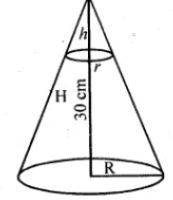
Volume of the given cone = (1/3)πR2H
Volume of the small cone = 1/27 th of the volume of the given cone.
(1/3)πr2h = (1/27) × (1/3)πR2H
Substitute H = 30
(1/3)πr2h = (1/27) × (1/3)πR2 × 30
⇒ r2h/R2 = 30/27
⇒ r2h/R2 = 10/9 ….(i)
From figure, r/R = h/H
r/R = h/30 ….(ii)
Substitute (ii) in (i)
(h/30)2 × h = 10/9
⇒ h3/900 = 10/9
⇒ h3 = (900 × 10)/9 = 1000
Taking cube root on both sides.
h = 10 cm
H – h = 30 – 10 = 20
The small cone is cut at a height of 20 cm above the base.
Question 18. A semi-circular lamina of radius 35 cm is folded so that the two bounding radii are joined together to form a cone. Find:
(i) the radius of the cone.
(ii) the (lateral) surface area of the cone.
Answer :
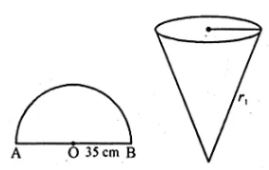
(i) Given radius of the semi circular lamina, r = 35 cm
A cone is formed by folding it.
So the slant height of the cone, l = 35 cm
Let r1 be radius of cone.
Semicircular perimeter of lamina becomes the base of the cone.
⇒ πr = 2πr1
⇒ r = 2r1
⇒ 35 = 2 r1
⇒ r1 = 35/2 = 17.5 cm
Hence the radius of the cone is 17.5 cm.
(ii) Curved surface area of the cone = πr1l
= (22/7) × 17.5 × 35
= 22 × 17.5 × 5
= 1925 cm2
Hence the lateral surface area of the cone is 1925 cm2.
-: End of ML Aggarwal Mensuration Exe-17.2 Class 10 ICSE Maths Solutions :–
Return to :- ML Aggarwal Solutions for ICSE Class-10
Thanks
Please Share with Your Friends
